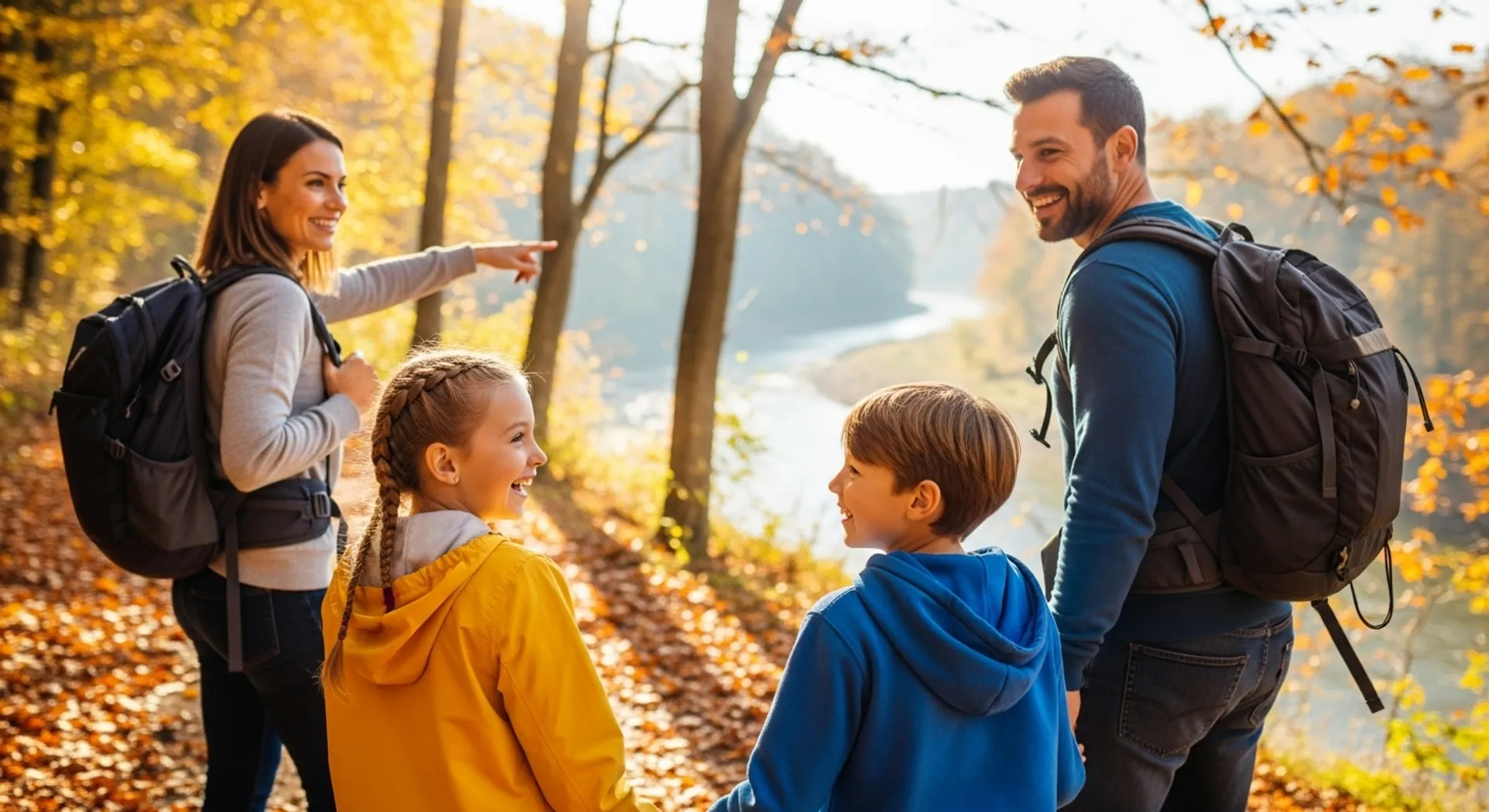Weekends arrive with both promise and pressure. After a busy week of work, school, and endless to-do lists, you want to make the most of your family time. But between exhaustion, conflicting schedules, budget constraints, and the temptation to just veg out on the couch, creating meaningful family adventures can feel overwhelming. Here’s the truth: family adventures don’t have to be elaborate, expensive, or Instagram-worthy to be meaningful. The best family weekends are the ones where you’re truly present, connecting with each other, and creating memories that will last long after the weekend ends.
Whether you have toddlers or teenagers, whether you prefer outdoor activities or cultural experiences, whether you have two hours or two days — there are countless ways to turn ordinary weekends into extraordinary family adventures. It’s not about doing everything or going everywhere. It’s about being intentional with your time together and creating experiences that bring joy, connection, and a break from routine.
Redefining What Family Adventures Mean
When you hear “family adventure,” you might picture expensive theme parks, exotic destinations, or elaborate outings. While those experiences can be wonderful, they’re not the only — or even the best — way to create meaningful family time. True family adventures are about shared experiences, not price tags or picture-perfect moments.
The Power of Simple Experiences
Some of the most memorable family moments happen during the simplest activities. A spontaneous picnic at a local park. An afternoon exploring a new neighborhood on foot. A family game tournament in your living room. Movie night with homemade popcorn and everyone’s favorite snacks. These low-key experiences often create the strongest memories because they’re relaxed, accessible, and focused on being together rather than checking boxes or documenting for social media.
Research from the American Psychological Association shows that quality time spent together as a family significantly strengthens relationships and contributes to children’s emotional well-being. What matters most isn’t what you’re doing — it’s that you’re doing it together, fully engaged and present.
Breaking Free from Weekend Pressure
Many parents feel guilty if they’re not constantly planning exciting activities or worry that their kids will be bored. This pressure can turn weekends into another source of stress rather than the rejuvenation they should provide. Give yourself permission to have both active adventure days and quiet rest days. Balance is key. Not every weekend needs to be packed with activities, and not every activity needs to be novel or educational.
Planning Family Adventures That Work for Everyone
The best family adventures consider everyone’s needs, interests, and energy levels. A successful outing doesn’t have to please everyone equally all the time, but it should offer something for each family member to enjoy.
Involve Everyone in the Planning
Rather than always deciding activities yourself, involve your family in the planning process. Even young children can contribute ideas. Create a family adventure list where everyone adds suggestions throughout the week. When the weekend arrives, choose from the list together. This collaborative approach builds anticipation, teaches decision-making skills, and ensures everyone has buy-in for the chosen activity.
For families with children of different ages, look for activities with multiple levels of engagement. A nature hike works for various ages if younger kids can explore at their own pace while older children tackle more challenging trails. A museum visit succeeds when there are interactive exhibits for little ones and more complex displays for teens.
Consider Energy Levels and Realistic Timing
Be honest about your family’s energy capacity. If everyone’s exhausted from a busy week, an ambitious all-day excursion might create more stress than joy. Sometimes a shorter, simpler outing followed by downtime at home is the perfect balance. According to parenting experts, quality matters more than quantity — two hours of engaged, present family time beats a stressed-out all-day marathon.
Pay attention to timing, especially with younger children. Plan around nap times and meal times when possible. Bring snacks and water for any outing. Have a backup plan if things aren’t working. Flexibility is your friend — if an adventure isn’t going well, it’s okay to cut it short or pivot to something else.
Balance Structure and Spontaneity
Some families thrive on careful planning, while others prefer going with the flow. Most benefit from a blend of both. Perhaps you plan one anchor activity for the weekend but leave space for spontaneous additions. Or maybe you keep a running list of ideas and choose based on weather, mood, and energy when the day arrives.
Spontaneous adventures often become the most memorable precisely because they’re unplanned. That impromptu stop at a playground, the unexpected detour to check out a yard sale, the decision to get ice cream on the way home — these unscripted moments often bring the most joy and laughter.
Types of Family Adventures to Try
Family adventures come in countless forms. Here are categories to inspire your weekend planning, with options for different budgets, timeframes, and interests.
Nature and Outdoor Exploration
Outdoor adventures offer fresh air, physical activity, and a change of scenery — all proven mood boosters. Visit local parks you haven’t explored yet. Try easy hiking trails appropriate for your kids’ ages. Go to a lake, river, or beach if you have water access. Set up a backyard camping experience complete with a tent, flashlights, and s’mores. Visit a botanical garden or nature center. Go on a neighborhood nature scavenger hunt looking for specific leaves, rocks, or wildlife.
The benefits of outdoor time for children are well-documented. Research from the National Institutes of Health shows that time spent in nature reduces stress, improves attention, and supports physical health. Plus, outdoor activities are often free or low-cost, making them accessible for any budget.
Cultural and Educational Experiences
Learning doesn’t have to feel like school. Visit local museums — many offer free or reduced admission days. Explore historical sites in your area. Attend community festivals or cultural celebrations. Visit the library and let each family member choose books, then spend the afternoon reading together. Take a class together — pottery, cooking, art, or whatever interests your family. Check out farmers markets and talk with vendors about their products.
These experiences broaden perspectives, spark curiosity, and provide conversation starters. They’re also wonderful ways to teach children about their community and the wider world in hands-on, engaging ways.
Active and Athletic Adventures
Physical activities provide exercise while building skills and confidence. Go swimming at a community pool. Try a new sport together — mini golf, bowling, tennis, or frisbee. Ride bikes on local trails. Visit a trampoline park or indoor climbing facility. Play pickup games at a park — soccer, basketball, or whatever your family enjoys. Take a family fitness class. Go roller skating or ice skating.
Active adventures are great for burning energy, especially with high-energy kids. They also teach teamwork, perseverance, and good sportsmanship in low-pressure environments.
Creative and Hands-On Projects
Sometimes the best adventures happen at home. Start a family art project that spans several weekends. Build something together — a birdhouse, a fort, a garden. Cook or bake together, letting kids help with age-appropriate tasks. Have a family craft day. Create a family time capsule. Work on a puzzle together. Start a family book club where everyone reads the same book and discusses it.
These activities foster creativity, teach practical skills, and create tangible results you can enjoy or display. They’re also perfect for bad weather days or when you need to stay close to home.
Community Connection Adventures
Adventures that involve giving back teach valuable lessons while strengthening community ties. Volunteer together at a local food bank or animal shelter. Participate in community cleanup days. Visit elderly neighbors or family members. Donate items together and talk about helping others. Participate in charity walks or runs as a family. Attend free community events like outdoor concerts or movie nights.
These experiences teach empathy, gratitude, and civic responsibility while showing children that they can make a difference in their community.
Making Adventures Memorable Without Extra Stress
The goal is connection and enjoyment, not perfection. Here’s how to maximize the positive aspects while minimizing common stress points.
Prepare Smart, Not Perfect
A little preparation prevents major headaches. Pack essentials the night before. Charge devices if you’ll need them. Check weather forecasts and have backup plans. Bring more snacks and water than you think you’ll need. Have a small first-aid kit in your car. But don’t overpack or overthink — you’re not leaving civilization, just going on an adventure.
Document Thoughtfully
Taking photos is wonderful for preserving memories, but don’t let documentation interfere with experiencing the moment. Take a few photos, then put the phone away and be present. Better yet, involve kids in taking photos — it gives them a role and creates unique perspectives. Consider creating a shared family photo album or journal where everyone contributes their favorite moments and memories from adventures.
Embrace the Imperfect
Things will go wrong. Someone will get cranky. Weather might not cooperate. An activity might flop. That’s okay — sometimes the mishaps become the best stories later. When challenges arise, handle them with humor and grace. Model problem-solving and flexibility for your children. The goal isn’t a perfect day; it’s time together and the resilience to handle whatever comes.
Creating Weekend Traditions
While variety keeps things interesting, regular traditions provide stability and something to look forward to. Consider establishing some recurring weekend activities that become part of your family’s identity.
Weekly or Monthly Rituals
Maybe it’s Saturday morning pancakes that everyone helps make. Sunday afternoon board game time. Monthly family movie nights with themed snacks. First-Sunday-of-the-month adventures to somewhere new. These rituals don’t need to be elaborate — their power comes from consistency and shared anticipation.
Seasonal Adventures
Create traditions around seasons and holidays. Apple picking in fall. Beach days in summer. Spring flower walks. Winter sledding or hot chocolate outings. These seasonal markers help children develop a sense of time’s rhythm and give the whole family things to look forward to throughout the year.
Living an Adventurous Family Life
Family adventures and meaningful weekends aren’t luxuries reserved for those with unlimited time and resources. They’re available to every family willing to be intentional about their time together. What makes a weekend adventure successful isn’t its cost, complexity, or social media worthiness — it’s the connection, laughter, and memories created along the way.
Your family’s adventures will look different from everyone else’s, and that’s exactly how it should be. What matters is finding activities that work for your unique family, within your circumstances, that bring you joy and clo




